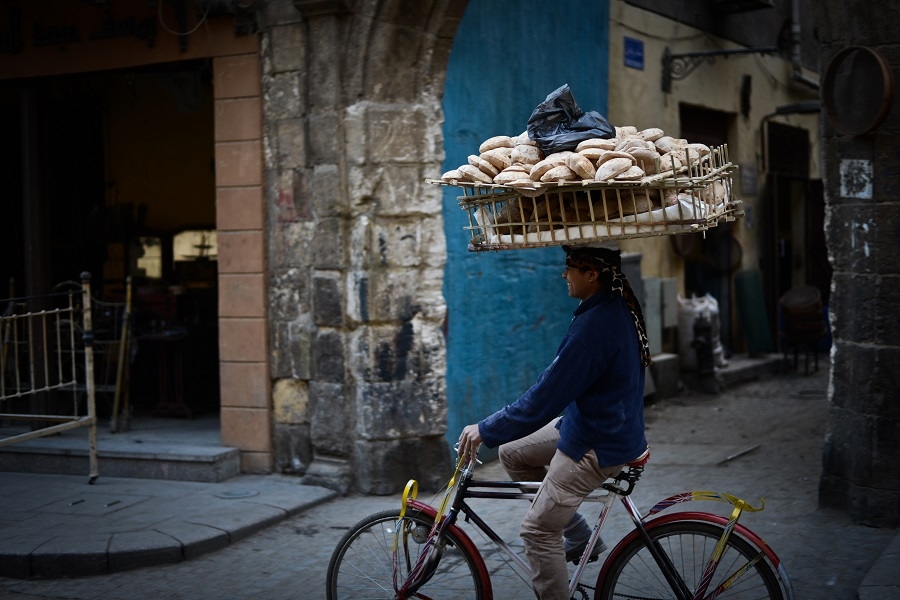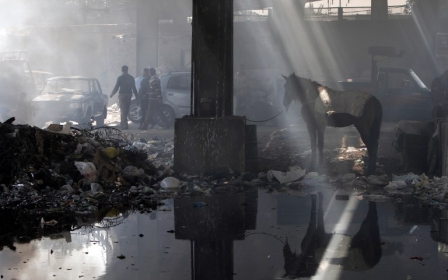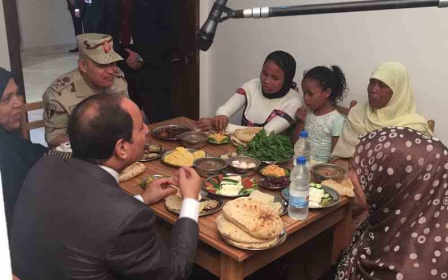Breadline Egypt: Millions face 'a slow death' due to growing poverty

"It's a slow death." With these words, Soliman Bakar and his wife summarise the economic situation in Egypt, where reports are increasingly showing just how dire things have become, with many unable to afford basic food and are struggling to make ends meet.
Bakar, a father of three, is a government employee. After his shift ends, he works as a taxi driver throughout the night and into the early hours of the morning. "I'm juggling two jobs, and my wife is also working, but even with the three salaries coming in, we're barely making it."
"The problems seem never ending, no matter where you turn you're faced with more and more difficulties. The price of gas, electricity, water, petrol, everything went up suddenly. Now that food went up, the pound took a hit too. The subsidised milk we used to get for our children is no longer available. Medicine has quadrupled in price - that's if you can even find it. Suddenly pharmacists are telling us there's a severe shortage in thousands of medicines, including medication for heart and liver failure. We're dying."
With his youngest in elementary school, Bakar's greatest fear is crushing his daughter's innocent adoration. She still believes in her father - the hero. "I feel helpless," Solimon says despondently. "There's nothing a father wishes for more than to be able to provide the very best for his children. But how? How can I face my children?"
Bakar is not alone in his struggles. Ahmed, a lawyer, broke down his family's expenses for the month to illustrate the increasingly desperate situation.
"Well, 1250 [Egyptian pounds] goes towards rent. Electricity, gas and water come up to 500. Lessons for my younger brother 1000, and food 2000... and that's not including personal expenses and transport."
His earnings? 1500 Egyptian pounds (LE) - nearly three times more than the poverty line which is set at 500 LE a month, the equivalent of $50. "I honestly don't know how we're living, or how we're making ends meet. How are we surviving? I honestly couldn't say. God knows."
'I honestly don't know how we're living, or how we're making ends meet. How are we surviving? I honestly couldn't say. God knows.'
While official findings of Egyptians living under the poverty line is at 28 percent, the figure is as high as 60 percent in Upper Egypt, and seems to be on the rise.
Jasmine Ali, a single mother, is one of the thousands of Egyptians living below the poverty line and finds it difficult, as the only breadwinner, to keep within her means.
"How can someone living on 500 LE be expected to live with their expenses and three children? House expenses, travel expenses, studies... We've gone months without meat and fruit, and two of the boys are working odd jobs to keep up with the cost of their studies."
"Fruit? Fruit is a luxury. It's sugar and oil and rice we need, and even these basic necessities can't be found, that's if you can afford it. And if you're lucky enough to find it in one of the private stores, they refuse to sell you more than a kilo or two."
The lack of affordable meat has led to exploitation, with a shocking phenomena of butchers attempting to pass off donkey meat as beef. Exploitation and corruption are not new to Egypt, and neither is the selling of donkey meat, however, what is new is the reassurance of a number of "specialists" who are seeking to reassure the public that donkey meat is safe to eat.
Hussein Mansour, head of the food safety organisation, an offshoot of the Ministry of Health, caused controversy when he said that it was virtually impossible to differentiate between different types of meat, be it donkey, cats or dogs, if they were minced. Lotfy Shawer, a former employee of the Ministry of Health, said that donkey meats had contributed in tackling a dietary gap in recent years.
Food safety scandals
There have also been increasing concerns over the safety and quality of locally produced food. "More and more, I'm hearing of people getting poisoned by the fruit and vegetables. Even if you can afford it, we don't know if we can risk it," says Ali.
Investigation of the poisoning that happened at Awlad Nour school in Manzala earlier this month, where 33 primary school children fell sick after bags of popcorn were sold past their sell by date, found that the dates on the packaging had been changed by the supermarket owner.
This incident is only one of many in a string of recent food-safety incidents. Earlier this year, a spate of Hepatitis A outbreaks, believed to have been caused by strawberries from Egypt, resulted in supermarket chains pulling Egypt-sourced produce off the shelves.
Ahmed, the lawyer, claimed that much local produce is contaminated because of polluted water being used in the wake of a drought caused by the building of Ethiopia's giant dam that is reducing the flow of the Nile into Egypt. "Because of the shortage of water after the [building of Ethiopia's] Renaissance Dam, alternative sources needed to be found, and crops were watered with recycled water from the sewage system."
"The water is always dirty, murky, at times even brown. The children are constantly sick," says Jasmine Ali.
'The water is always dirty, murky, at times even brown. The children are constantly sick.'
Concerns about food safety are not new. Russia, one of Egypt's largest wheat suppliers, said it would ban the import of Egyptian fruit and vegetables after its regulatory watchdog said the produce violated international norms. But speculation at the time believed it to be retaliation over the wheat debacle witnessed earlier in the year, when the Egyptian Agriculture Ministry reinstated its zero tolerance policy toward contamination of imported wheat by fungus, making grain purchases exceedingly difficult.
Egypt went back and forth with regulations over ergot, a grain fungus, amid claims it causes cancer. Ergot can cause hallucinations if consumed in large amounts but is considered harmless in low quantities. Earlier this year, the Food and Agriculture Organisation (FAO) conducted a risk assessment and found that ergot posed no threat to Egyptian crops. The Agriculture Ministry, however, formed a committee to investigate risks and findings concluded that grain should be brought from regions where past shipments didn't contain ergot, such as Russia, Ukraine, Latvia and Lithuania.
As the row over the safety of imported grain continued, global markets took fright with Egypt stipulating zero tolerance on ergot, overturning their previous decision, then once again reversing their decision ahead of a tender.
With estimates placed at 11.5 million tonnes annually, Egypt is currently the world's largest wheat importer, and wheat remains a matter of life and death where tens of millions of people depend on the government's vital subsidy system. Changes to terms of purchase mean even higher food prices, a far cry from the government's claims of trying to make food more affordable.
Egypt is currently the world's largest wheat importer, and wheat remains a matter of life and death where tens of millions of people depend on the government's vital subsidy system
The provision of cheap bread is central to the survival of the Egyptian government and demands for bread was the signature chant in the Egyptian revolution in 2011. Back in 1977, a rise in bread prices forced the government to deploy tanks in the streets to quell riots that followed.
'Bread, freedom and social justice'
It was with these three demands, "bread, freedom and social justice," that the Mubarak government appeared to crumble in Egypt, as thousands of people took to the streets in 2011 demanding his downfall and for these three basic necessities to be met. Five years later, freedom and social justice are eroding quickly, and prices are shooting up.
In a shocking video, captured by witnesses on phone camera, a taxi driver - as yet unnamed - self-immolated in front of an army centre in Alexandria, after reportedly shouting criticism of President Sisi's government and protesting high prices and poor living conditions. At the time of writing he was undergoing treatment for 95 percent burns. In that act, the desperate taxi driver mirrored that of the Tunisian street vendor six years ago who set himself alight, helping light the spark for what would be called the Arab Spring.
"The economic situation has been bad for quite some time, but it is intensifying at a rate that few in the population expected. It is about to hit a sharper turn, as the government is expected to lift more subsidies - something rather inevitable - and devalue the Egyptian pound," explains Dr H A Hellyer, senior non-resident fellow at the Atlantic Council and the Royal United Services Institute in London. "All of that is likely to lead to inflation and price increases - alas, rather inevitable, but it will hit the more vulnerable sections of society tremendously," adds Dr Hellyer.
As the country's economic situation deteriorates, more and more people are voicing their concerns, with a number of videos surfacing on social media, as Egyptians openly express their frustration and desperation over living conditions.
The government's response has been to offer empty platitudes, advising people to "tighten their belts," and in perhaps the strangest move yet, asked them to donate their spare change to Egypt.
Growing dissent
"We had hope in some of the government's plans - be it the plans to built a new capital or the Suez canal or others - and hoped that it would improve our quality of life, but what we're seeing instead is a rapid decline in the economy," Bakar said. "Everything is getting worse and worse, the Egyptian pound no longer holds any value, the youth are unemployed in their droves and even more are choosing to risk their lives to migrate illegally. They've chosen the risk of death or imprisonment over staying and facing certain death."
As faith in the government dwindles, unrest in the street is becoming more pronounced, with calls for a "Revolution of the Poor" being made to take place on 11 November.
Despite the crackdown witnessed by security forces, Solimon is adamant he will go. "I'm with the 'Revolution of the Poor'." For how much longer will I have to sit and accept this half a life? I'll go out, but do you think anyone will even care? Will I find a comforting pat, or bullets that will settle in my heart? It no longer matters anymore," Bakar said.
He added: "People are talking. Especially the youth, they're sitting unemployed, they've graduated with degrees and have nothing to show for it, and they're growing restless and frustrated. People are desperate."
'They're sitting unemployed, they've graduated with degrees and have nothing to show for it, and they're growing restless and frustrated. People are desperate'
At a time of unprecedented suppression of dissent, the thought of going onto the streets seems daring, if not foolhardy. Since the passing of the protest law, security officers have been quick to dismantle, often with brutal force, any form of budding protest, and it seems unlikely that a repeat of 25 January 2011 events that toppled Mubarak will be allowed.
"Egypt isn't about to fall into some kind of societal chaos - the economic situation is hardly tenable, but the regime that rules Egypt is secure, as there are no alternatives to the current leadership that the main power holders in Egypt are interested in," Hellyer added. "Anything can happen in Egypt, and the 11th of November is weeks away, so things could change, but I don't see any indication, at least as of yet, that the 11th of November is going to be more than a small, localised phenomenon, if that."
This article is available in French on Middle East Eye French edition.
New MEE newsletter: Jerusalem Dispatch
Sign up to get the latest insights and analysis on Israel-Palestine, alongside Turkey Unpacked and other MEE newsletters
Middle East Eye delivers independent and unrivalled coverage and analysis of the Middle East, North Africa and beyond. To learn more about republishing this content and the associated fees, please fill out this form. More about MEE can be found here.




